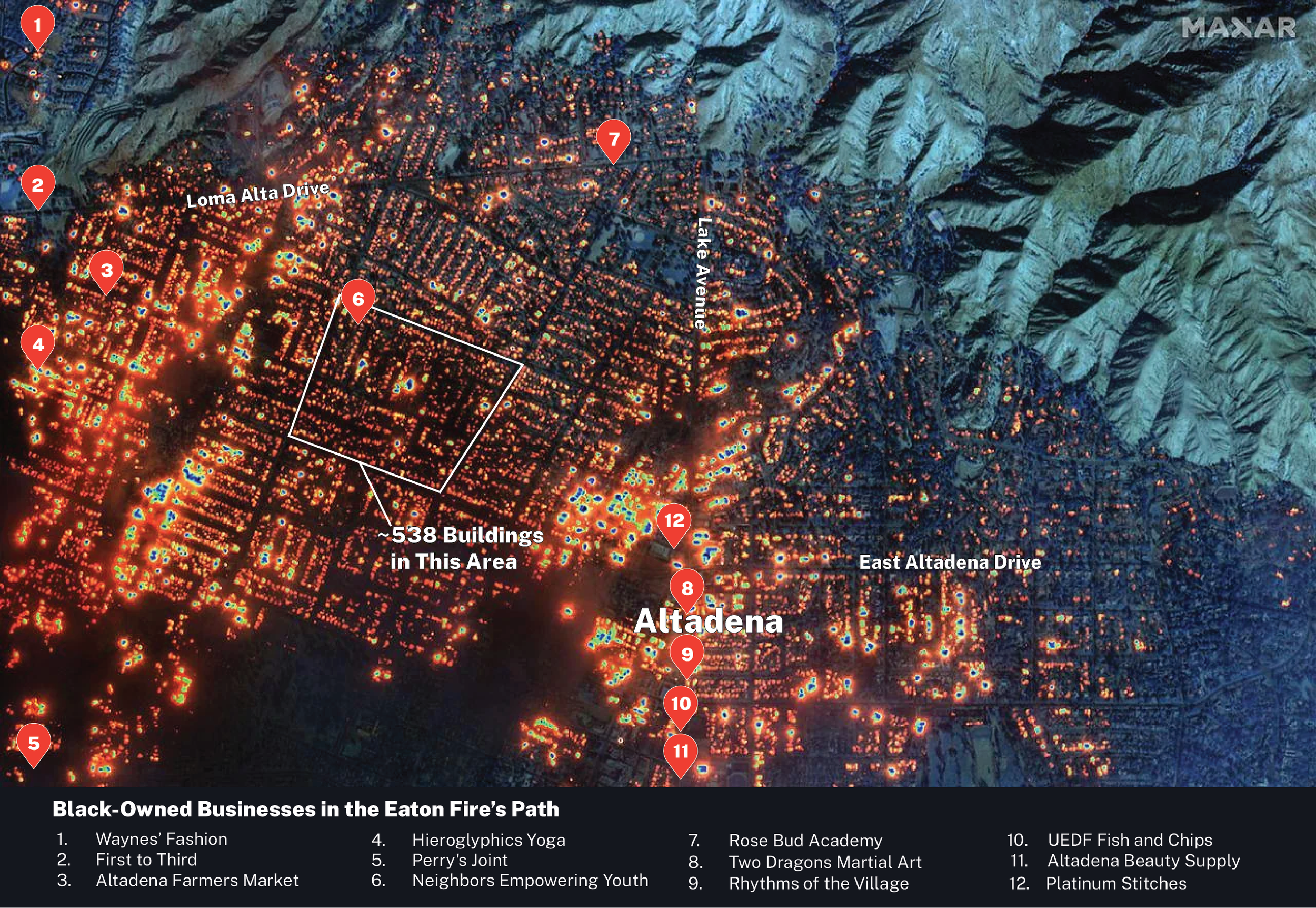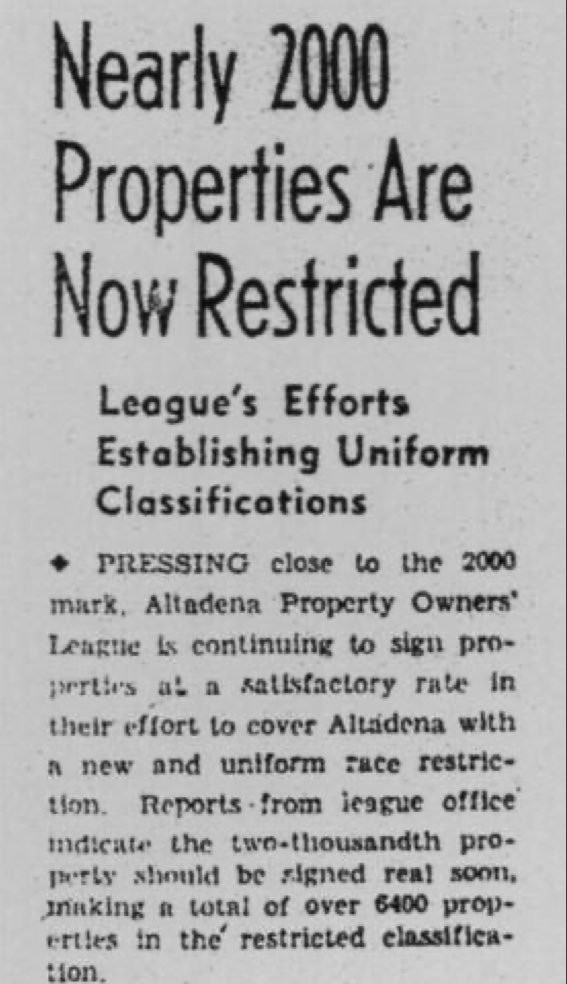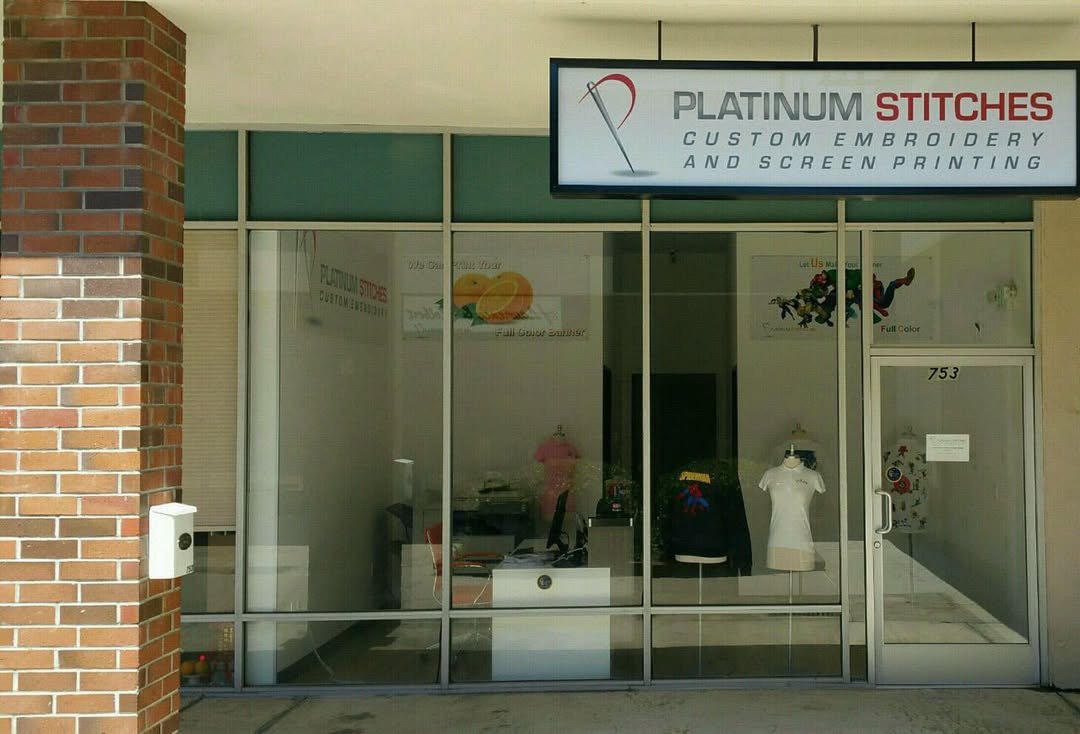As Los Angeles Burns, Help Prevent Cultural Erasure + Environmental Racism
Black-Owned Businesses in the Eaton Fire’s Path. Background photo courtesy of The Guardian, Business List from City of Pasadena
As wildfires rage across Los Angeles, headlines are dominated by fears for landmarks like the Getty Villa and Eames House. But in Altadena, the Eaton Fire rages through a historically Black, working-class neighborhood, erasing cultural heritage with less public attention. This disparity in coverage reveals a deeper, systemic issue—how climate change and racial inequality collide to threaten not just recovery efforts, but the very fabric of Los Angeles’ cultural diversity. Here’s how you can help prevent this spatial injustice from taking root:
Learn and Share Black Histories: Amplify the stories of communities like Altadena.
Donate Mindfully: Support working-class neighborhoods often overlooked in disaster relief efforts.
Stay Engaged: Recovery is a marathon, not a sprint. The media may move on, but we must remain steadfast.
Links to actionable resources are included at the bottom of this article.
The Black History of Altadena
Robert Curry Owens, the grandson of Robert Owens— one of Altadena’s first Black home-owners (photo curtesy of Lowlifes RCC)
Altadena’s Black community has long been a haven for families fleeing the Jim Crow South and California’s sundown towns. Its roots trace back to Robert Owens, a man born into slavery in Texas in 1806, who earned his freedom and became one of Los Angeles’ wealthiest men. Owens, known for helping others gain their freedom, including Biddy Mason, laid the foundation for Altadena’s Black legacy.
By the early 20th century, a trickle of Black families had carved out a thriving community in Altadena in spite of racist housing policies like racial covenants, which restricted property sales to only white buyers. Starting in the 1930s, the Home Owners Loan Corporation (HOLC) began redlining Altadena, concentrating people of color in the west side of
News clipping on racial covenants in Altadena and Pasadena (Photo courtesy of Cienna Benn @sideburnbaby)
the city, and making it very difficult for these families to buy homes– except in communities where property values were not likely to increase. Black migration to Altadena intensified as the 134 and 210 freeways were built through Black neighborhoods, and residents were displaced (see A People’s Guide to Los Angeles).
Redlined Map of Altadena (courtesy of Mapping Inequality) overlayed with the extent of the Eaton Fire
By 1955, Altadena was still overwhelmingly (95%) white, but civil rights victories and “white flight” soon opened the door to broader Black homeownership. In 1959, residents in Altadena created the Open Housing Covenant, where individual residents signed agreements stating, “any family should be free to choose its place of residence.” Because few other cities in the San Gabriel valley welcomed people of color at that time, Altadena quickly became a hub for Black professionals, entrepreneurs, and entertainers including: Jackie Robinson, the first Black athlete to play in Major League Baseball; Octavia Butler, a highly celebrated science-fiction writer; and Willa Beatrice Brown, the first Black woman in the United States to receive a commercial pilot’s license, and many more.
Platinum Stitches, a Black-owned business in Altadena, run by a family who has lived there for four generations (Photo courtesy of Cienna Benn @sideburnbaby).
Generations later, Altadena boasts a 70% homeownership rate, with West Altadena—the hub for its historic Black community—remaining 34% Black and 27% Latino (compared to just 7% Black across LA County). But the Eaton Fire, which has consumed over 14,000 acres, and 6,700 buildings, has destroyed homes and businesses central to this legacy, threatening not just property but the generational wealth and resilience passed down since before the Civil Rights Movement. Oral histories, preserved by Black elders, risk being lost alongside these cultural landmarks, deepening fears of gentrification and displacement in the wake of this devastating cultural and economic loss.
Racial Trends in Emergency Response
Research on environmental emergency response offers a stark warning for the Eaton fire; This crisis– and Los Angeles’ emergency response to it– could exacerbate racial wealth inequality, and worsen health outcomes for its Black and Latino Residents.
A study by the American Sociological Association reveals a troubling pattern: white families in disaster- areas often see an increase in wealth due to generous reinvestment, while Black families see a decrease. The same study found that federal disaster aid (FEMA) exacerbates these racial disparities. Communities of color also typically take longer to recover from natural disasters than their white counterparts. In New Orleans, 20 years after Hurricane Katrina, remnants of destruction are still visible in the primarily Black 9th ward.
Altadena Community Church burned in the Eaton fire (photo courtesy of LA Times)
The risk of inequities extends beyond finances. With wildfire smoke blanketing the air, Black communities face the most acute impacts: rising asthma attacks and respiratory illness cases, disrupted access to jobs, and mental health challenges. These effects parallel the COVID-19 Pandemic, when people of color experienced higher rates of death and serious health complications.
Recovery efforts in Los Angeles have the potential to perpetuate or disrupt these cycles of spatial injustice– and it’s not too late to prevent history from repeating itself. Local mutual aid groups and community organizations are leading the way, stepping in to fill critical gaps in emergency response—but broad support is essential. Join us in mobilizing an emergency response to the LA Fires that can repair, instead of exacerbate racial inequality.
Resources to Take Action
1.Learn and Share Black Histories: Amplify the stories of communities like Altadena
2. Donate Mindfully: Support working-class neighborhoods often overlooked in disaster relief efforts.
Donate directly to Eaton fire victims: Venmo and Gofundme Spreadsheet
Donate Directly to Displaced Black Family's GoFundMes
In Person Volunteer Opportunities
LA Chamber of Commerce Small Business Recovery Fund
3. Stay Engaged: Recovery is a marathon, not a sprint.
Follow @pasadenablackpages
Follow @MutualAidLA
Follow @octavias_bookshelf (hyper-local mutual aid for Eaton fires)
Special thanks to the Black leaders and creators in Altadena who led the way in preserving this history, and brought our attention to the issue.
Cienna Benn @cilangee (instagram) @sideburnbaby (X)
@pasadenablackpages (instagram)
@blackwall.st (instagram)






